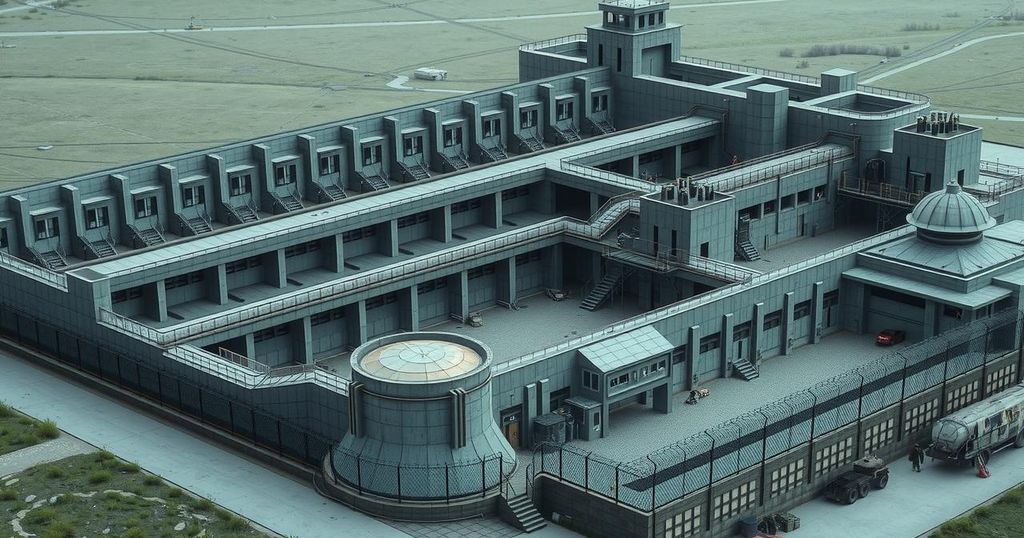World news
AP, ARAGUA, ASIA, COLOMBIA, CUBA, DHS, EL, EL SALVADOR, FEDERAL COURT, GUN VIOLENCE, HOMELAND SECURITY, KRISTI NOEM, MEXICO, NAY, NAYIB BUKELE, NO, NOEM, NORTH AMERICA, PATROL, PHILIPPINES, POLITICS, SOCIAL ISSUES, SOCIAL MEDIA, SOUTH AMERICA, TE, TREN DE, U. S, UNITED STATES, VIOLENCE
Marisol Gonzalez
0 Comments
DHS Secretary Noem’s Visit to El Salvador Prison for Deported Venezuelans
U.S. Homeland Security Secretary Kristi Noem visited an El Salvador prison for deported Venezuelans, highlighting the conditions and ongoing deportation initiatives. The Trump administration defends its actions despite human rights criticisms, asserting the individuals are gang affiliates. Legal challenges now affect future deportations, raising questions about the detainees’ status and treatment within the penal system.
On Wednesday, U.S. Homeland Security Secretary Kristi Noem visited a high-security prison in El Salvador that houses Venezuelans deported by the Trump administration, allegedly linked to gang activities. During her visit, she toured two crowded cell blocks, an armory, and an isolation unit, showcasing the conditions of the facility. Noem’s trip aims to demonstrate the administration’s commitment to deporting individuals it categorizes as the “worst of the worst.”
The Trump administration has defended its actions in court as justified, despite human rights activists condemning the prison’s conditions and alleged abuses. As part of her itinerary, Noem will discuss strategies to enhance the number of deportation flights with El Salvador’s President Nayib Bukele, signaling ongoing collaboration between the two countries in immigration enforcement.
Noem’s visit, part of a larger three-day trip to Central and South America, explores how the U.S. can strengthen immigration policies. The deported Venezuelans were removed under the Alien Enemies Act after being linked to the Tren de Aragua gang, with some legal challenges underway concerning their deportation.
Notably, a federal appeals court recently upheld an order preventing further deportations under this act, creating uncertainty regarding the long-term status of the detainees. Advocates and relatives have asserted that many of those deported lack criminal records and have no gang affiliations, although the government has not provided evidence regarding the identities of the deportees.
Following their deportation, individuals were filmed being transported under harsh conditions, raising concerns over their treatment and lack of access to legal recourse. El Salvador’s current prison environment is emblematic of President Bukele’s extensive anti-gang initiative, which has led to the detention of tens of thousands of individuals under a state of emergency, subjecting many to imprisonment without due process.
Today’s prison environment is devoid of visitors, educational opportunities, or support for the imprisoned Venezuelans, who have been left without consular assistance since diplomatic relations between the two countries were severed in 2019. Justice Minister Gustavo Villatoro highlighted the difficulties these detainees face, stating, “No one expects that these people can go back to society and behave.”
The visit of Secretary Kristi Noem underscores the ongoing efforts of the Trump administration to deport individuals categorized as significant threats. The conditions within El Salvador’s prison illuminate broader issues surrounding human rights and due process for deportees, particularly as these individuals face potential indefinite detainment without proper legal recourse. The tensions between the U.S. and El Salvador regarding deportations reveal complex intergovernmental relations amid a rigorous enforcement landscape.
Original Source: www.pbs.org




Post Comment